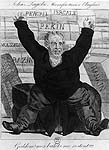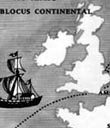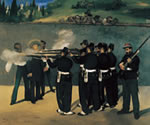| |
| |
EDITORIAL
The Berlin Decree and the continental system have been the source of much discussion over the years. Paul Schroeder(1) gives an interesting catalogue of differing opinions: "Was the Continental System a new departure or merely a continuation of earlier Revolutionary and Napoleonic policies? Was it an essentially defensive response to the British blockade and British industrial competition (Jean Tulard [and now Thierry Lentz]), or a decisive switch to the offensive (François Crouzet)? Was economic warfare against Britain the real raison d'être of the Empire after Trafalgar, making the conquest of Northern Europe necessary (Albert Sorel), or was this economic warfare actually more an excuse for further Continental conquests (Edouard Driault)? Did the Continental System as originally conceived represent a constructive programme for industrial development of Europe under France's lead, a programme later spoiled by war and Napoleon's selfishness (Marcel Dunan), or was it from the beginning a programme for French economic imperialism and exploitation (Evgenii Tarle and others)?" We don't propose to have found the answer, but we hope that this week's letter will show you that the great Napoleonic debates continue with undying passion. Enjoy your read.
Peter Hicks
(1) The transformation of European politics 1763-1848, Oxford: Clarendon Press, 2003, p. 307-08

|
|
|
| |
THIS MONTH'S ARTICLE
Eli F. Heckscher, "The Berlin Decree", Chapter II of Part II of his book, The Continental System: An Economic Interpretation, Oxford: Clarendon Press, 1922
In the autumn of 1806, Napoleon's victory on the Continent was complete. Consequently he was so far perfectly right when in later years he pointed to the battle of Jena as the natural antecedent to the execution of the Continental System, inasmuch as that battle placed into his hands the control of the Weser, Elbe, Trave, Oder, and all the coastline as far as the Vistula. The great manifestation of this consisted in the Berlin decree, issued November 21, 1806, from the capital of the power that had been last and most thoroughly vanquished.
(c) Fondation Napoléon

|
|
|
| |
BICENTENARY DOSSIER "CONTINENTAL SYSTEM OR BLOCKADE"
On 21 November, 1806, Napoleon decreed, from his Palace in Berlin, a blockade of the British Isles and forbade all British goods and commerce entering the continent. This came to be known as the 'continental' blockade since de facto most of the European continent was under French influence. Napoleon hoped to asphyxiate the British economy and to compel Britain to come to the negociating table. Ostensibly in retaliation for the blockade of all the coast from Brest to the Elbe enacted by Britain by its Order in Council of 16 May, 1806, the Berlin decree was in effect Napoleon's longest and most far-ranging attempt to solve the 'Angleterre' problem.
The text of the Berlin Decree, 21 November, 1806
Articles
- Eli F. Heckscher, "The Berlin Decree", Chapter II of Part II of his book, The Continental System: An Economic Interpretation, Oxford: Clarendon Press, 1922
For a more traditional 'legendary' viewpoint see
- Philippe Masson, Napoleon and England (Part II) - translated from the Souvenir Napoleonien (vol. 400, 1995)
Images
- Map of contreband routes at the time of the Continental Blockade
- Burning and sale of English goods
- Jean-Baptiste Collin, Comte de Sussy (1750-1826), Minister for Commerce and Manufacturing (detail)
- John Lagobe, Manufacturier anglais : Goddem ! Mes balots me restent!!! (John Lagobe, English manufacturer: Dammit! No-one bought my bales!)
(c) Fondation Napoléon

|
|
|
| |
EXHIBITION
Manet and the Execution of Maximilian, MomA, New York, USA
Abandoned by the French government that crowned him and sent him to Mexico, the Emperor Maximilian was executed by a firing squad of Benito Juárez's army at Querétaro, north of Mexico City, on June 19, 1867. News of the execution reached Paris on July 1, just as Napoleon III was inaugurating that year's Universal Exposition. Édouard Manet set to work almost immediately, and by early 1869 he had completed a series of four paintings and one lithograph of the subject. The show includes educational matter and an online exhibition.
(c) MoMA

|
|
|
| |
PHD VIVA
On Tuesday 5 December, 2006, Matthieu Brejon de Lavergnée, recipient of a Fondation Napoléon research grant in 2005, is to defend his thesis: "The society of Saint-Vincent-de-Paul in Paris during the 19th century: prosopography of a fervent Catholic elite" Supervisor: Jacques-Olivier Boudon, Professor of history, Paris IV-Sorbonne, 9am at the Université Paris IV-Sorbonne, 54 rue Saint-Jacques – Salle des Actes.
NEW ACQUISITIONS AT THE FONDATION NAPOLEON'S LIBRARY, THE BIBLIOTHEQUE MARTIAL LAPEYRE
Why not have a look at our recent acquisitions or simply consult the online library catalogue.
NB
The Bibliothèque Martial Lapeyre - Fondation Napoléon will be closed exceptionally on the two Wednesdays 22 and 29 November, 2006.

|
|
|
| |
200 YEARS AGO
On 18 November, 1806, the renowned ancien-régime French architect Claude Nicolas Ledoux, «ci-devant architect to the king, and member of the old Académie d'architecture», died as a result of an "apoplectic paralysis". (Moniteur, 22 November, 1806). Whilst many of Ledoux's works no longer exist, some masterpieces remain, notably the Salines d'Arc-et-Senans, the théâtre in Besançon and the famous pavillions or "barrières d'Octroi" in a ring around inner Paris (Nation, colonnes du Trône, Pavillion in Parc Monceau)...
On 21 November, 1806, Napoleon passed the Berlin decree establishing a blockade of the British isles and hermetically sealing off the continent from British commerce.
150 YEARS AGO
On 20 November, 1856, a real estate transaction regarding 436 hectares to the west of Paris was concluded between Achille Fould, Minister of the Imperial Household and the Société Pallu et compagnie related to the «restoration of properties acquired, the clearing of the terrain, the building of roads and streets, the piping in of water and the contruction, rental and re-sale of properties thus constructed.» the garden town of Le Vésinet was born.
Wishing you an excellent, Napoleonic, week.
Peter Hicks
Historian and Web editor
THE NAPOLEON.ORG BULLETIN, No 390, 17-23 November, 2006
Interested in the work of the Fondation Napoléon? Why not participate, either generally or in a specific project, by making a donation.
© this Napoleon.org weekly bulletin is published by the Fondation Napoléon. Reproduction or all or part of this bulletin is forbidden, without prior agreement of the Fondation Napoléon.

|
|
|
|
|
|
|
|
THIS WEEK in the MAGAZINE
SNIPPETS
- The Salon du Premier Empire, planned for 1, 2 and 3 December, 2006, in Rueil-Malmaison has been cancelled.
PRESS REVIEW
- History Today December 2006: Premiere of Beethoven's Violin Concerto
WHAT'S ON
Other events:
- Second Empire wine and food and a visit to Elisa's Palace, North-Eastern Italy
Exhibitions:
- Manet and the Execution of Maximilian, MomA, New York, USA
- Champignon Bonaparte - illustrations by Gilles Bachelet, Boulogne, Paris, France
- Dagoty in Paris - the Empress Josephine's porcelain manufactory, Rueil-Malmaison, France
- Napoleon III and Europe - 1856, Paris, France
- Napoleon, an intimate portrait, Columbia, South Carolina, USA
- Public Portraits, Private Portraits 1770-1830, Grand Palais, Paris, France
- Louis Napoleon: at the court of the first King of Holland, 1806-1810, Apeldoorn, Netherlands
Got a problem with the letter? Try the home page: http://www.napoleon.org
<<
|
|



